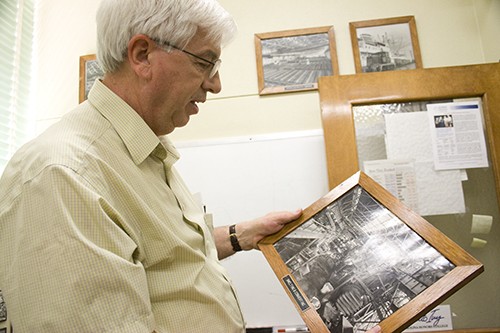The UA reached a record number of agreements helping to bring university-developed technology into the marketplace in 2010.
The UA Office of Technology Transfer signed 64 licensing and option agreements last year, which was a 49 percent increase from 2009, according to a report presented to the Arizona Board of Regents. The report also showed increases in invention disclosures and patent applications within the university compared to the past several years.
Filing inventions through the Office of Technology Transfer starts the process of translating research into its practical application, according to Patrick Jones, director of the Office of Technology Transfer. Once an invention is licensed, it can eventually be sold in the marketplace as, or as part of, a product or service.
Research at the UA has not been affected by the economic recession as heavily as other areas within the university, Jones said. Industry funding, as well as funding from the federal government, during the past several years has helped fuel the innovation increase.
“”We were very successful in competing for stimulus funding targeted at supporting infrastructure and research to generate new businesses and job creation,”” Jones said.
Revenue from resulting licensing agreements returns to the university as well as the inventor and related laboratory. Revenue from licensing and options totaled approximately $1.26 million in 2010, which was 27 percent more than in 2009, according to the report.
The amount is about 40 percent less than the office’s five-year peak of $2.11 million in 2006. Revenue is dependent upon the market success of products licensed in years past, according to Jones.
“”Not every product is successful,”” Jones said. “”Not everything that’s transferred into the public sector makes it into the future.””
Much of the research leading to inventions is funded by an outside source for a particular purpose, according to Amy Phillips, technology transfer licensing specialist for the College of Optical Sciences. The Office of Technology Transfer is then responsible for managing the intellectual property.
Communication of the services offered by the office is helping to increase invention disclosures, Phillips said. The College of Optical Sciences received 33 disclosures in 2010, which was 20 percent of the total disclosures at the university.
“”It’s really because the Office of Technology Transfer is helping faculty, students and staff be more aware of the opportunity to have invention disclosures,”” Phillips said.
Notable license and option agreements detailed in the report include the Public Broadcasting System licensing the distribution rights for “”The Phoenix Mission: Onto the Ice,”” created by Arizona Public Media. The College of Optical Sciences also licensed optical devices and materials to Canon Corp.
“”It keeps us on the cutting edge of research,”” Phillips said. “”Perhaps it’s evidence of that.””
David Lynch, professor of mining engineering and materials science and engineering, received a patent last year for research related to the creation of silicon. Lynch’s research involves the purification and production of solar-grade silicon to be used in various applications, such as solar panels.
The research is funded mostly by industry sources and is affiliated with the Solar Technology Research Corp. Lynch plans to open a pilot-plant to create silicon and may eventually open a commercial plant.
Lynch said technology transfer helps in disseminating knowledge and improving the economy.
“”We sit at the UA on a depository of information mostly contained within the faculty,”” Lynch added. “”We have the opportunity to put some of that knowledge to work and into practical application, creating companies and jobs for the people of Arizona.””









